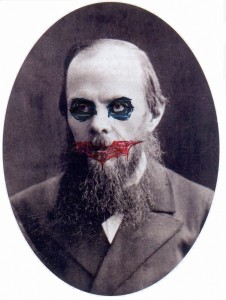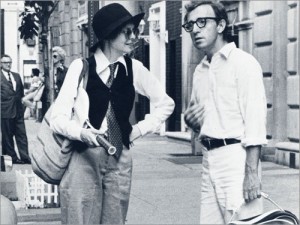Please enjoy this guest post by Jared Bauer, looking at the literary and metaphysical origins of The Dark Knight. Like it? Then tell us in the comments!

Let’s assume for a second that everything the Joker says is nonsense. After all, he is the Joker. And what does the Joker do? Well, joke, of course. But why does he joke? Part of the reason that The Dark Knight has raised the bar for its genre is because, unlike its contemporaries, it dares to answer this question. Why did Jack Nicholson joke? Because the acid accident made him crazy. Why did Doc Ock go on a rampage to destroy New York? Because the mechanical tentacles made him crazy. Up until The Dark Knight, it generally just stopped there.
Simultaneously the most harrowing and the most absorbing aspect of Heath Ledger’s Joker is that the Nolan Brothers did not equip him with madness. They armed him with a philosophy. He jokes because everything is trivial. He is pure nihilism. As if Nolan was writing a thesis for his character, the Joker makes his grand entry:
Bank Manager: Criminals in this town used to believe in things: Honor. Respect. What do you believe in, huh? What do you believe in?!
Joker: I believe that whatever doesn’t kill you simply makes you….. stranger.
What does it mean? Nothing. What does the Joker believe in? Nothing. Mere Anarchy.
It is precisely this philosophy that served as a perpetual source of inner torment for one of the world’s greatest novelists, Fyodor Mikhailovich Dostoevsky. Quite possibly the most famous autonomous chapter in western literary history , and a milestone of modern thought, is “The Grand Inquisitor,” part of Dostoevsky’s magnum opus, The Brothers Karamazov. It’s about a 30 minute read, but if 19th century Russian Lit isn’t your thing, don’t sweat it, I’ll explain everything on the way.

Existential Motifs in Russian Literature.
The poem “The Grand Inquisitor” is delivered by Ivan Fyodorovich Karamazov, an over-educated, pedantic, atheistic scholar who would probably idolize Ayn Rand if he were alive today. It takes place during the Spanish Inquisition. People are being hung from ceilings, the torture racks are breaking joints, and the screams are echoing through the extravagantly expensive churches. All is good. That is, until Jesus Himself descends from Heaven and starts healing the sick and reviving dead children. When the Grand Inquisitor sees that Jesus has returned, he incarcerates him. The bulk of the short poem illustrates the Grand Inquisitor telling Jesus that mankind is too ignoble to adhere to his teachings. In order to maintain order and keep the masses dumb and happy, the Inquisitor must inhibit the “freedom, free reason, and science” of Christ’s teachings in order to save the human race from the “horrors of slavery and confusion.”
For those of you who haven’t read it, stay with me. For those of you who have read it, I hope I haven’t offended you too much. Don’t worry, I’ll dive in to the specifics soon.
small typo , Ayn Rand should be a she not a he in your Grand Inquisitor paragraph
The antecedent of “he” Karamazov.
But good eye; I think you’d enjoy our short-lived (but perhaps someday to be revived) Thursday Grammar Series.
I am genuinely impressed, good work.
Top notch.
Very impressive.
There’s been plenty of discussion on the ferry game, but I don’t think that the outcome redeems the people of Gotham. When the “citizen” tries to push the button and fails, it’s out of weakness, not faith. He, and the women and children in the next shot, are scared and disappointed when he can’t push the button. The “citizens” show the degree to which they need Batman. They are paralyzed by their fear of consequences, so they cannot do what they desire, even if their inaction puts them in peril. If Bruce Wayne were on the boat, instead of hunting the Joker, wouldn’t he have detonated the prisoners’ boat? Maybe, maybe not, but that’s what the “citizens” wanted. They wanted someone else to make the decision, someone with the willpower to judge human life.
Weakness, cowardice, ruthlessness: these are the components of the good citizens of Gotham.
Thanks for the comments.
I agree, it’s not out of faith that Batman will save them or belief in an ideal that stops the citizen from pressing the button, but the fact that neither boat pressed the button redeems them to a degree. Perhaps they didn’t do it out of fear of the consequences, but I think that Nolan was trying to display a man who was afraid to take the lives of other human beings.
Of course all the people on the boat are going to say they want to press the button, who wouldn’t? The Joker had made good on all of his promises up until that point, so why should they think they would have a chance of survival without pressing the button? But there is a vast difference in saying it and doing it. Of course they all want to blow up the boat and save themselves. They’re only human. But the fact that both boats were able to silence their innate cannibalistic instincts and decide not to press the button certainly suggests a hopeful and elevated sense of morality.
As for if Bruce Wayne was on the boat, that’s a tough call. As we saw in the movie, Batman’s one rule is that he will never take a life. Even during the standoff in the street between him and the Joker, Batman chose not to kill the Joker even though he would be saving many lives by doing so.
Question: could the group setting of the ferry test have had an influence on how the people on both boats acted/didn’t act?
Spectacular piece, by the way.
Going back to the boats… We talk about the man who picks up the detonater and then cannot do it because he would be taking life… What about the prisoners?
The prisoners do not have a debate about this, they all look interested but no one subsquently decides to take charge (in a way that the other boat had a vote) then one prisoner takes the detonater and without really over thinking it (sorry lol), throws it out the window..
No one tried to stop him or asked him why, or even gave him a dirty look… they all accepted it…
What do we make of these guys? In comparison to the joker and indeed the other boat?
@Laurence: call me a cynic, but I think it says worse of the civilians than it does of the prisoners. I believe the “We should put it to a vote!” comment is an illustration of the conceit among Western democracies that anything voted on or elected acquires a patina of legitimacy. As if murdering a ferry full of car thieves, non-violent drug users and cigarette smugglers becomes okay because we counted ballots.
It’s the big prisoner*, on the other hand, who stands up and does the right thing without waiting to be asked. In this, he is the person on the boats most like Batman – operating outside social norms, not seeking approval or even permission, being the thankless conscience of a corrupt world.
* I’m paraphrasing Christopher Bird here, but isn’t it amazing that in a film starring Christian Bale, Gary Oldman, Morgan Freeman, Heath Ledger and Aaron Eckhart, the most critical moral pivot in the entire movie is given to Tiny Lister? And he pulls it off?
Lister was also the President in “The Fifth Element.” Just throwing that one out there… ;)
I’m sure everything you’re getting at was purely intentional, Perich. The question of blind faith in democracy comes up all the time in subtle ways, but it’s pretty explicit during the scene in the restaurant where the ballerina says flat out, “But this is a democracy.”
@Perich: Yes I would agree that it does make the civilians on the boat look much worse, all of this is fine. What I don’t understand is why the Joker could not forsee the eventual outcome of the 2 ferries…
The Joker was pretty much a step ahead the whole film, even when we thought he was caught, he planned it, he even counted on Batman stopping him and still had the 2-face card left to play.
Given all of this when it’s past 12 and neither boat has blown the other one up, surely this must shake the joker’s foundations? Does anyone think the Joker would have planned for this (other than blowing the two boats up himself)
I thought his telling Batman about Harvey as he was hanging upside-down *was* the Joker’s contingency plan for not being able to blow up the ferries. Not immediately or independently, but something he knew he could fall back on.
No I think he was going to do that regardless of the outcome of the ferries. The ferries work in a way as a diversion for Batman, he’s more occupied by the joker rather than looking for Dent.
Also if you check the jokers face when it’s past 12 and neither of them have blown up, he is slightly taken aback by it.
@Lawrence: We’re in 100% agreement, so why the “No”? Perhaps I didn’t word it right, so allow me to attempt again. I felt the Joker would have told Batman about Dent no matter what, but his wording, how he pitched it, would depend on what happened with the ferries. So it was something he knew he could fall back on *if necessary* as a shining example of proof of the depravity of humanity; otherwise, it would be a reinforcement of the explosion on the river. Yeah, he probably did expect the boats to blow, but he still knew he had Dent’s fall up his sleeve, jic.
I always believed that the most important part of the grand inquisitor poem was the aspect following the Inquisitors speech, where The lord kisses him, and then leaves without uttering a word. This is, to me, what the ferry gambit was about.
See, the inquisitor may have lost his faith, or perhaps never had it to begin with. He spoke his sad truth to Jesus who by his belief should not even exist, of how he overestimated man and our fragile and weak natures, and Jesus, instead of reacting or fighting, acts with love and then leaves once again into the night.
I always believed that the Inquisitor begun to believe after this, but continued his crusade because he believed it his duty. He was the joker, just for an instance in his estimations of human nature, and of the nature of god, and In one instant of love his beliefs were countered by a single act. In short, despite the years of thought he had given he had forgotten the meaning of faith, which he ony gained afer that night.
My slightly more positive spin on the verse, which I see mirrored in the way that the jokers so far upheld as true beliefs come crashing down when the humans, the simple humans on the barges all live. I do not believe this detracts from the significance of the religious argument, but it could be overlooked as a very important aspect of the Poem.